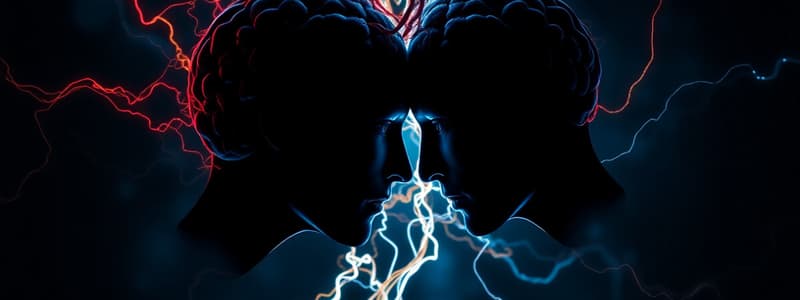Podcast
Questions and Answers
Why is learning about potentially controversial topics important in a psychology course?
Why is learning about potentially controversial topics important in a psychology course?
- To avoid dealing with complex issues by sticking to safer topics.
- To promote personal growth, empathy, and social awareness. (correct)
- To reinforce existing personal biases and viewpoints.
- To solely focus on the negative aspects of society.
Before psychology was considered a formal discipline, what area of study did it originate from?
Before psychology was considered a formal discipline, what area of study did it originate from?
- Philosophy (correct)
- Anthropology
- Biology
- Sociology
What was the primary method used by Wilhelm Wundt to explore the structure of the mind?
What was the primary method used by Wilhelm Wundt to explore the structure of the mind?
- Case studies of individuals with psychological disorders.
- Introspection, focusing on systematic self-reports of mental experiences. (correct)
- Behavioral observation in controlled laboratory settings.
- Analysis of dreams and unconscious thoughts.
Which of the following best describes the focus of structuralism in psychology?
Which of the following best describes the focus of structuralism in psychology?
Which of the following is NOT a stated benefit of classroom discussion of controversial topics?
Which of the following is NOT a stated benefit of classroom discussion of controversial topics?
Which school of thought in psychology emphasizes the study of observable behaviors rather than internal mental processes?
Which school of thought in psychology emphasizes the study of observable behaviors rather than internal mental processes?
Sigmund Freud's psychodynamic theory places great emphasis on which of the following?
Sigmund Freud's psychodynamic theory places great emphasis on which of the following?
According to the content, Margaret Floy Washburn is notable for which achievement?
According to the content, Margaret Floy Washburn is notable for which achievement?
What is the primary focus of the course's approach to teaching?
What is the primary focus of the course's approach to teaching?
How are lecture slides made available to students?
How are lecture slides made available to students?
Which of the following psychological perspectives considers how mental processes and interpretations affect our actions, rather than being solely driven by reward or punishment?
Which of the following psychological perspectives considers how mental processes and interpretations affect our actions, rather than being solely driven by reward or punishment?
What is the weighting of each of the three non-cumulative multiple-choice tests?
What is the weighting of each of the three non-cumulative multiple-choice tests?
Which approach to understanding the world relies on using logical thought and argumentation?
Which approach to understanding the world relies on using logical thought and argumentation?
B.F. Skinner's work primarily centered around understanding which of the following aspects of behavior?
B.F. Skinner's work primarily centered around understanding which of the following aspects of behavior?
How can students earn marks through applied reflections?
How can students earn marks through applied reflections?
Functionalism, as established by William James, is most concerned with:
Functionalism, as established by William James, is most concerned with:
How many mini assignments are there in this course and what are their weights?
How many mini assignments are there in this course and what are their weights?
In terms of grades, how are they updated throughout the term?
In terms of grades, how are they updated throughout the term?
What was a primary barrier faced by women in psychology, as highlighted in the text?
What was a primary barrier faced by women in psychology, as highlighted in the text?
What is the advice given regarding approaching the professor or TA if you are having trouble?
What is the advice given regarding approaching the professor or TA if you are having trouble?
What is mentioned as a possible common concern for students?
What is mentioned as a possible common concern for students?
What does the term 'falsifiability' refer to in scientific claims?
What does the term 'falsifiability' refer to in scientific claims?
Which principle emphasizes that the simplest explanation is often the best?
Which principle emphasizes that the simplest explanation is often the best?
How is applied research different from basic research?
How is applied research different from basic research?
What is the primary concern when a claim presents extraordinary evidence?
What is the primary concern when a claim presents extraordinary evidence?
Which of the following accurately represents the 'third variable problem'?
Which of the following accurately represents the 'third variable problem'?
What is the first step in the scientific method as used by psychologists?
What is the first step in the scientific method as used by psychologists?
Which of the following best describes confirmation bias?
Which of the following best describes confirmation bias?
What is belief perseverance?
What is belief perseverance?
What is patternicity?
What is patternicity?
What constitutes a scientific theory?
What constitutes a scientific theory?
What is an example of pseudoscience?
What is an example of pseudoscience?
The 'Mozart Effect' refers to what kind of phenomenon?
The 'Mozart Effect' refers to what kind of phenomenon?
What is a common warning sign of pseudoscience?
What is a common warning sign of pseudoscience?
What is the primary function of a budget according to the content?
What is the primary function of a budget according to the content?
What does Terror Management Theory suggest about human anxiety?
What does Terror Management Theory suggest about human anxiety?
What is one key danger of pseudoscience mentioned in the content?
What is one key danger of pseudoscience mentioned in the content?
Which principle of scientific thinking emphasizes considering alternative explanations for an outcome?
Which principle of scientific thinking emphasizes considering alternative explanations for an outcome?
What fallacy involves believing something must be true simply because many others believe it?
What fallacy involves believing something must be true simply because many others believe it?
What does the concept of 'correlation doesn’t mean causation' imply?
What does the concept of 'correlation doesn’t mean causation' imply?
Which principle of scientific thinking requires 'extraordinary evidence' for extraordinary claims?
Which principle of scientific thinking requires 'extraordinary evidence' for extraordinary claims?
How does critical thinking relate to scientific method as mentioned in the content?
How does critical thinking relate to scientific method as mentioned in the content?
Flashcards
Active learning
Active learning
A method of instruction designed to encourage active participation and engagement from students.
Evaluation
Evaluation
The process of assessing student learning through various methods, such as tests, assignments, and projects.
Course syllabus
Course syllabus
A brief description of how a course is structured, including assessment methods, policies, and expectations.
Applied reflection
Applied reflection
Signup and view all the flashcards
URPP (Undergraduate Research Participation Program)
URPP (Undergraduate Research Participation Program)
Signup and view all the flashcards
Course policies
Course policies
Signup and view all the flashcards
Office hours
Office hours
Signup and view all the flashcards
Time management
Time management
Signup and view all the flashcards
Structuralism
Structuralism
Signup and view all the flashcards
Introspection
Introspection
Signup and view all the flashcards
Wilhelm Wundt's Lab
Wilhelm Wundt's Lab
Signup and view all the flashcards
What did Wilhelm Wundt study?
What did Wilhelm Wundt study?
Signup and view all the flashcards
Roots of Psychology
Roots of Psychology
Signup and view all the flashcards
Naïve Realism
Naïve Realism
Signup and view all the flashcards
Scientific Method
Scientific Method
Signup and view all the flashcards
Scientific Theory
Scientific Theory
Signup and view all the flashcards
Confirmation Bias
Confirmation Bias
Signup and view all the flashcards
Belief Perseverance
Belief Perseverance
Signup and view all the flashcards
Psychological Pseudoscience
Psychological Pseudoscience
Signup and view all the flashcards
Patternicity
Patternicity
Signup and view all the flashcards
Pseudo-profound Bullshit
Pseudo-profound Bullshit
Signup and view all the flashcards
Functionalism
Functionalism
Signup and view all the flashcards
Psychodynamic
Psychodynamic
Signup and view all the flashcards
Behaviorism
Behaviorism
Signup and view all the flashcards
Cognitivism
Cognitivism
Signup and view all the flashcards
Authority
Authority
Signup and view all the flashcards
Reason
Reason
Signup and view all the flashcards
Observation
Observation
Signup and view all the flashcards
Third variable problem
Third variable problem
Signup and view all the flashcards
Reverse causality
Reverse causality
Signup and view all the flashcards
Falsifiability
Falsifiability
Signup and view all the flashcards
Replicability
Replicability
Signup and view all the flashcards
Extraordinary claims
Extraordinary claims
Signup and view all the flashcards
Terror Management Theory
Terror Management Theory
Signup and view all the flashcards
Emotional Reasoning Fallacy
Emotional Reasoning Fallacy
Signup and view all the flashcards
Bandwagon Fallacy
Bandwagon Fallacy
Signup and view all the flashcards
Not Me Fallacy
Not Me Fallacy
Signup and view all the flashcards
Opportunity Cost (of Pseudoscience)
Opportunity Cost (of Pseudoscience)
Signup and view all the flashcards
Direct Harm (of Pseudoscience)
Direct Harm (of Pseudoscience)
Signup and view all the flashcards
Critical Thinking
Critical Thinking
Signup and view all the flashcards
Six Principles of Scientific Thinking
Six Principles of Scientific Thinking
Signup and view all the flashcards
Study Notes
Course Information
- Course name: PSYC 1010
- Lecture 1: Introduction to psychology
- Instructor: Dr. Alisha Salerno
Teaching Approach
- Foster a positive learning environment
- Promote student engagement
- Focus on accessibility and flexibility
Class Structure
- Lectures: In-person, interactive, class discussions, demonstrations, try-it-together/small group activities, breaks, lecture slides are posted before class
- Evaluations:
- 3 non-cumulative multiple-choice tests (19% each)
- Applied reflections (2% each, 12% total) – choose 6
- 2 mini assignments (10%, 15% each)
- URPP (4%)
- Course quiz (2%)
- Assignments turnaround time: 2-3 weeks
Undergraduate Research Participant Pool (URPP)
- Participate in real research to earn up to 4% toward your grade
- Register for an account on the URPP webpage.
- Grades are posted at the end of the term, not updated live.
Course Policies
- Teaching Assistants (TAs)
- Rounding policies
- Missed tests
- Extension coupons
- Academic honesty/posting on course-sharing websites
- Accommodations
- Office hours and email addresses
Tips for Success
- Stay on top of readings and assignments
- Talk to the professor/TA if having trouble, don't wait until the end.
- Use proper email etiquette
- Make friends (with the same work ethic) - beware of group chats.
- Ask questions and meet with TAs. If applying to graduate school, get to know your professors.
Common Concerns and Solutions
- Final/cumulative exams
- Resources for studying
- Time management/course balance/work-life balance
- Making friends/meeting new people
Thorny/Controversial Topics
- Social psychology (conformity, obedience)
- Psychological disorders (crime, solitary confinement, incarceration)
- Psychology and law (wrongful convictions, eyewitness misidentification, etc.)
- Important topics for personal growth, empathy, understanding, social awareness, problem-solving, and deeper understanding of complex issues. Discussions should be respectful and tolerant of dissenting opinions.
Psychology's Past and Present
- Psychology originally considered a part of philosophy (ancient Greeks)
- Formal beginning in late 19th century.
- Wilhelm Wundt: first psychology lab (1879) – studied building blocks of the mind (structuralism) using introspection (think chemistry principles, periodic table of elements).
Structuralism
- Wilhelm Wundt and E.B. Titchener
- Founded/credited as a founder of the school
- Understanding the structure and characteristics of the mind through introspection.
- Emphasized systematic observation of consciousness
Theoretical Perspectives in Psychology
- Five primary schools: Structuralism, Functionalism, Behaviorism, Cognitivism, and Psychodynamic
- Explains behavior and shaped modern psychology.
Functionalism
- William James – first American psychologist
- Purpose of cognitive processes, establishing functionalism.
- Focus on what the mind does and how behaviors functions
- Inspired by the theory of natural selection.
Psychodynamic
- Founded by Sigmund Freud
- Studied hysteria and neurosis
- Theorized many of his patients' problems arose from the unconscious mind
- Could access unconscious mind through dream analysis.
- Focuses on how the unconscious affects a person's experiences, particularly during early childhood.
Behaviorism
- John B. Watson – father of Behaviorism
- Believed objective analysis of the mind was impossible.
- Focus on observable behaviors.
- Aims to control behavior
- Used in modern behavioral therapy and CBT
B.F. Skinner
- Behavior impacted by its consequences
- Studied principles of changing behavior through reinforcement and punishment: operant conditioning.
Cognitivism
- Piaget and Neisser
- Focused on understanding the mental processes that underlie thinking.
- How thinking causes behaviors/actions (not reward or punishment) but about their interpretation.
Women in Psychology
- Social prejudice hindered women's participation in the field.
- Excluded from graduate programs.
- Representation: Still low representation of women in faculty at the highest rank, though in general some improvement
- Career/wage difference: Male professors earn significantly more than their female counterparts.
How do we know what's true?
- Authority
- Reason
- Observation
Intuitive Knowledge
- Intuitive ideas (birds of a feather, opposites attract).
- Intuitive ideas not always correct. (Absence makes the heart grow fonder, out of sight out of mind)
- Not all intuitive ideas are incorrect. (Can't teach an old dog new tricks).
Safety in Numbers
- Case study: Bystander effect (37 witnesses to a murder did not call police)
Why we can't always trust our common sense?
- Naïve Realism (Seeing is believing—perception might not always reflect reality).
- Examples: The earth seems flat (but its actually round), we seem to stand still (but are actually rotating around the sun).
Common Sense and Accuracy
- Common sense can be accurate, and generate hypotheses: (Snap judgments on facial traits 65% accurate for determining sexual orientation)
Scientific Method
- Approach used by psychologists (and other scientists) to systematically acquire knowledge about behavior and other phenomena.
- Steps:
- Identify a question of interest.
- Formulate a testable explanation
- Carry out research to support/refute.
Scientific Theory
- Explanation for a wide range of findings in the natural world; a testable prediction is called a hypothesis.
- Example—bystander effect.
Bias Awareness
- Confirmation bias: The tendency to seek out/emphasize evidence that supports the hypothesis (e.g., police decision-making).
- Belief perseverance: Sticking to a belief even when the evidence is contradictory.
- Example—"don't confuse me with the facts" (not only personal but pervasive).
- Real life examples: police investigations, political views, medical decision-making, conspiracy theories, sports fandom, stereotyping, medical self-diagnosis, relationship conflicts, product reviews
Psychological Pseudoscience
- Imposters of science; seems scientific but lacks scientific backing.
- Warning signs: Use of psychobabble, lack of self-correction, overreliance on anecdotal evidence, extraordinary claims without extraordinary evidence.
The Mozart Effect
- Pseudoscientific claim about the impact of Mozart's music on infant and child development.
Finding comfort in our beliefs
- Terror management theory: We experience anxiety due to awareness of death's inevitability but unpredictability, find purpose/meaning in worldviews.
- Tested by experimentally manipulating mortality salience – how much we think about death.
The antidote for pseudoscience
- Think scientifically.
- Separate science from pseudoscience.
- Avoid common logical fallacies.
Common Logical Fallacies
- Emotional reasoning fallacy: Using emotions instead of evidence.
- Bandwagon fallacy: Believing something is true simply because many people believe it.
- "Not me fallacy": Believing others are biased, but not oneself.
Dangers of Pseudoscience
- Opportunity cost (e.g., time, energy/effort invested in treatments that may not be effective)
- Direct harm (e.g., treatments that might be dangerous)
- Blocks critical thinking (e.g., stem cell research, GMOs).
Critical Thinking
- Set of skills to evaluate claims open-mindedly and carefully.
- Key to the scientific method, requires overcoming biases.
Six Principles of Scientific Thinking
- Ruling out rival hypotheses
- Correlation isn't causation
- Falsifiability
- Replicability
- Extraordinary claims require extraordinary evidence
- Occam's razor (principle of parsimony)
Modern Psychology
- The branches of psychology include experimental, clinical, developmental, child, etc.
- Includes areas of focus like neuropsychology, I-O psychology, sports psychology, social/personality psychology, forensic psychology.
How Psychology Affects Our Lives
- Basic research examines how the mind works
- Applied research utilizes research to solve real-world problems.
Studying That Suits You
Use AI to generate personalized quizzes and flashcards to suit your learning preferences.




